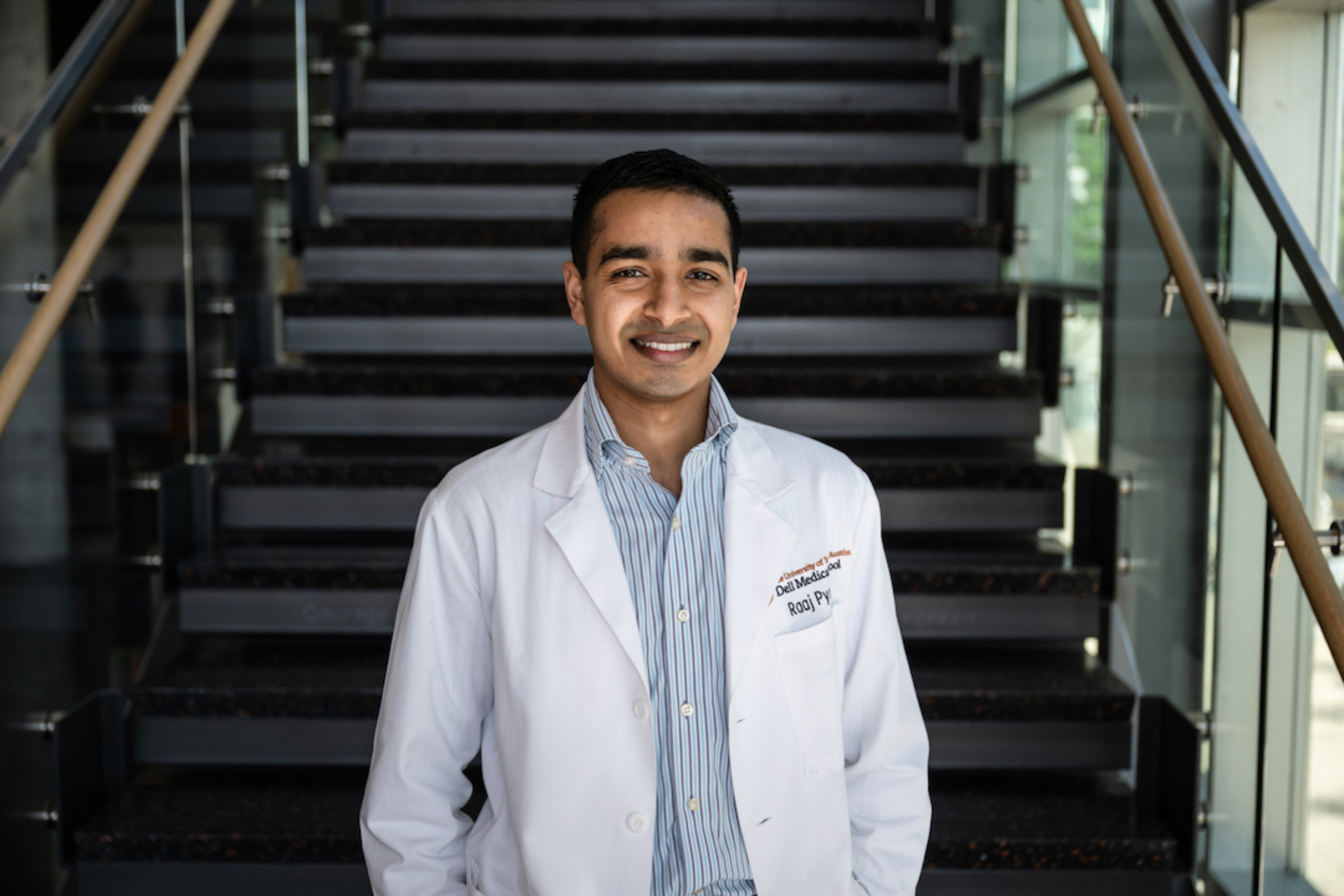Heart disease is one of the leading causes of death in Travis County. And globally, diabetes cracked the top 10 causes of death for the first time in 2019.
Raaj Pyada, Dell Med ‘25, is keenly focused on the ways that food — and the food system — hold the key to reducing the impact of chronic diseases like these. Seeking a career in internal medicine where he can directly influence patient outcomes informed by diet choices, Pyada is spending his medical school years invested in research and community engagement to advance systems-level solutions right away.

Raaj Pyada, Class of 2025
Q&A With Pyada:
How are you already making an impact in local nutrition and primary care?
During my third year at Dell Med, I worked as a business analyst for a local social impact business named The Cook’s Nook, which provides nutrition solutions — the aim is to bring culturally-relevant and nutritious meals to those affected by the intersection of food insecurity and a health condition.
I also worked as a research assistant with the Burgermaster Lab at Dell Med, which is a behavioral nutrition lab led by Marissa Burgermaster, Ph.D. We are working on evaluating the educational utility of an app called Nutri, which is a clinical decision support tool that aids primary care physicians in providing nutrition counseling in their clinics.
Lastly, I volunteer at (and am now operations lead of) the Manor Free Clinic, a free clinic for uninsured patients in Manor, Texas.
With the time in my third year, I wanted to get as complete a picture as possible around the different ways we can shape nutrition interventions — from how a doctor counsels a patient about nutrition, all the way to systems-level interventions where we flag vulnerable patients and prescribe them healthy food.
Where have you found the opportunity to make the greatest impact as a medical student?
One of my most impactful projects lately has been advancing the Food is the Best Medicine program at The Cook’s Nook.
Food is the Best Medicine aims to increase rates of breastfeeding and reduce rates of postpartum depression among food-insecure postpartum mothers who give birth at Ascension Seton Medical Center Austin. Mothers receive home delivery of a combination of prepared meals, meal kits, fresh produce and pantry staples every week for eight weeks — totaling about 120 meal equivalents per mother over the course of the program.
The program is the result of a novel cross-sector collaboration between a hospital system/foundation, a school of public health, a nonprofit and a for-profit social impact company: The players are Ascension Seton, UTHealth Houston, Farmshare Austin and The Cook’s Nook, respectively.
I was a program manager with Food is the Best Medicine during my time with the company, and while I was there, we officially launched in September 2023 and delivered more than 7,500 meals and two tons of fresh fruit and vegetables to over 80 new mothers between then and May 2024.
And that’s only the beginning: We also won a $400,000 grant from the American Heart Association in January 2024, bringing a part of this critical investment in the potential of similar interventions by the association to Central Texas. In the future, Food is the Best Medicine hopes to formally evaluate its impact and expand the program further, either by extending the amount of time that mothers get assistance and/or expanding to other hospital sites from which to identify clients.
In 200 words or less, describe a singular memory that has shaped how you approach your life or work.
My family moved around a lot when I was a kid — if there’s one thing I learned to do while I was growing up, it was packing up and moving. Yet some of the most rewarding moments in my life have stemmed from times when I did the opposite of that: digging in and engaging with my community.
One morning, as an eighth grader in North Carolina, I heard a story regarding a proposed bill to repay the survivors of the state eugenics program, which unjustly sterilized and stripped the reproductive rights of over 7,500 citizens from the 1920s to the 1970s. My curiosity about the story led me to suggest it as the focus of a group history assignment. The experience culminated in me and my classmates testifying before a state senate committee meeting and endorsing the very bill I first heard about. Money for the bill was allocated to the state budget the next year.
Engaging with this story is part of what sparked my interest in medicine — I am in awe of the profound human effect and ethical responsibility associated with the field.